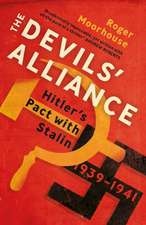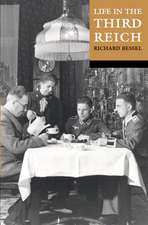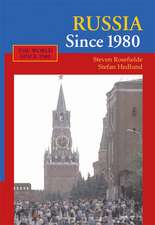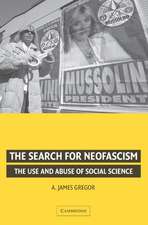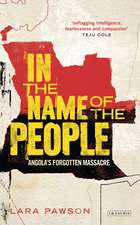Life after Death: Approaches to a Cultural and Social History of Europe During the 1940s and 1950s: Publications of the German Historical Institute
Editat de Richard Bessel, Dirk Schumannen Limba Engleză Paperback – 4 mai 2003
| Toate formatele și edițiile | Preț | Express |
|---|---|---|
| Paperback (1) | 327.41 lei 6-8 săpt. | |
| Cambridge University Press – 4 mai 2003 | 327.41 lei 6-8 săpt. | |
| Hardback (1) | 564.66 lei 6-8 săpt. | |
| Cambridge University Press – 4 mai 2003 | 564.66 lei 6-8 săpt. |
Din seria Publications of the German Historical Institute
- 14%
 Preț: 757.52 lei
Preț: 757.52 lei - 8%
 Preț: 530.73 lei
Preț: 530.73 lei -
 Preț: 283.52 lei
Preț: 283.52 lei - 14%
 Preț: 757.52 lei
Preț: 757.52 lei -
 Preț: 352.64 lei
Preț: 352.64 lei - 11%
 Preț: 695.06 lei
Preț: 695.06 lei -
 Preț: 207.41 lei
Preț: 207.41 lei -
 Preț: 282.17 lei
Preț: 282.17 lei - 11%
 Preț: 574.38 lei
Preț: 574.38 lei -
 Preț: 289.39 lei
Preț: 289.39 lei - 14%
 Preț: 1279.78 lei
Preț: 1279.78 lei -
 Preț: 439.33 lei
Preț: 439.33 lei - 11%
 Preț: 552.00 lei
Preț: 552.00 lei - 11%
 Preț: 524.04 lei
Preț: 524.04 lei - 14%
 Preț: 871.52 lei
Preț: 871.52 lei - 11%
 Preț: 458.99 lei
Preț: 458.99 lei - 14%
 Preț: 755.87 lei
Preț: 755.87 lei -
 Preț: 453.12 lei
Preț: 453.12 lei - 14%
 Preț: 756.70 lei
Preț: 756.70 lei -
 Preț: 331.28 lei
Preț: 331.28 lei -
 Preț: 318.06 lei
Preț: 318.06 lei - 14%
 Preț: 755.69 lei
Preț: 755.69 lei -
 Preț: 353.83 lei
Preț: 353.83 lei - 11%
 Preț: 578.20 lei
Preț: 578.20 lei -
 Preț: 321.90 lei
Preț: 321.90 lei -
 Preț: 284.78 lei
Preț: 284.78 lei - 14%
 Preț: 937.61 lei
Preț: 937.61 lei -
 Preț: 471.93 lei
Preț: 471.93 lei -
 Preț: 422.91 lei
Preț: 422.91 lei - 11%
 Preț: 589.88 lei
Preț: 589.88 lei -
 Preț: 315.72 lei
Preț: 315.72 lei - 11%
 Preț: 693.36 lei
Preț: 693.36 lei - 14%
 Preț: 870.01 lei
Preț: 870.01 lei -
 Preț: 287.07 lei
Preț: 287.07 lei - 23%
 Preț: 950.10 lei
Preț: 950.10 lei -
 Preț: 384.34 lei
Preț: 384.34 lei -
 Preț: 448.49 lei
Preț: 448.49 lei - 5%
 Preț: 312.62 lei
Preț: 312.62 lei -
 Preț: 319.52 lei
Preț: 319.52 lei -
 Preț: 243.74 lei
Preț: 243.74 lei
Preț: 327.41 lei
Nou
Puncte Express: 491
Preț estimativ în valută:
62.66€ • 65.17$ • 51.73£
62.66€ • 65.17$ • 51.73£
Carte tipărită la comandă
Livrare economică 14-28 aprilie
Preluare comenzi: 021 569.72.76
Specificații
ISBN-13: 9780521009225
ISBN-10: 0521009227
Pagini: 376
Ilustrații: 1 b/w illus.
Dimensiuni: 152 x 229 x 24 mm
Greutate: 0.5 kg
Ediția:New.
Editura: Cambridge University Press
Colecția Cambridge University Press
Seria Publications of the German Historical Institute
Locul publicării:New York, United States
ISBN-10: 0521009227
Pagini: 376
Ilustrații: 1 b/w illus.
Dimensiuni: 152 x 229 x 24 mm
Greutate: 0.5 kg
Ediția:New.
Editura: Cambridge University Press
Colecția Cambridge University Press
Seria Publications of the German Historical Institute
Locul publicării:New York, United States
Cuprins
Introduction: violence, normality, and the construction of postwar Europe Richard Bessel and Dirk Schumann; 1. Post-traumatic stress disorder and World War II: can a psychiatric concept help us understand postwar society? Alice Förster and Birgit Beck; 2. Between pain and silence: remembering the victims of violence in Germany after 1949 Sabine Behrenbeck; 3. Paths of normalization after the persecution of the Jews: the Netherlands, France, and West Germany in the 1950s Ido De Haan; 4. Trauma, memory and motherhood: Germans and Jewish displaced persons in post-Nazi Germany, 1945–9 Atina Grossman; 5. Memory and the narrative of rape in Budapest and Vienna in 1945 Andrea Petö; 6. 'Going home': the personal adjustment of British and American servicemen after the war Joanna Bourke; 7. Desperately seeking normality: sex and marriage in the wake of war Dagmar Herzog; 8. Family life and 'normality' in postwar British culture Pat Thane; 9. Continuities and discontinuities of consumer mentality in West Germany in the 1950s Michael Wildt; 10. 'Strengthened and purified through ordeal by fire': ecclesiastical triumphalism in the ruins of Europe Damian van Melis; 11. The nationalism of victimhood: selective violence and national grief in western Europe, 1940–60 Pieter Lagrou; 12. Italy after fascism: the predicament of dominant narratives Donald Sasson; 13. The politics of post-fascist aesthetics: 1950s west and east German industrial design Paul Betts; 14. Dissonance, normality, and the historical method: why did some Germans think of Tourism after May 8, 1945? Alon Confino.
Recenzii
"The volume has considerable value in bringing together some of the most innovative social and cultural historians of postwar Europe." Journal of Social History
Descriere
This book offers a novel approach to the cultural and social history of Europe after the Second World War.

